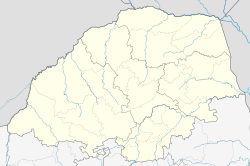Taaiboschgroet | |
|---|---|
| Coordinates: 22°50′46″S28°54′32″E / 22.846°S 28.909°E | |
| Country | South Africa |
| Province | Limpopo |
| District | Capricorn |
| Municipality | Blouberg |
| Area | |
• Total | 2.65 km2 (1.02 sq mi) |
| Population (2001) [1] | |
• Total | 5,268 |
| • Density | 2,000/km2 (5,100/sq mi) |
| Time zone | UTC+2 (SAST) |
Taaiboschgroet is a village via the D1589 road in the Blouberg Local Municipality under the Capricorn District Municipality in the Limpopo province of South Africa under the leadership of Kgosi Mamadi.


